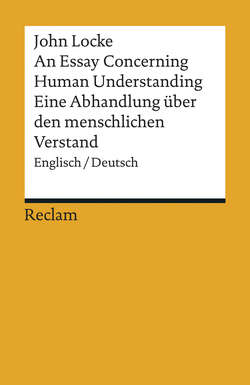Читать книгу An Essay Concerning Human Understanding / Ein Versuch über den menschlichen Verstand. Auswahlausgabe - John Locke - Страница 17
На сайте Литреса книга снята с продажи.
CHAPTER VII
ОглавлениеOf simple Ideas of both Sensation and Reflection
§ 1. THERE be other simple Ideas, which convey themselves into the Mind, by all the ways of Sensation and Reflection, viz.
Pleasure, or Delight, and its opposite.
Pain, or Uneasiness.
Power.
Existence.
Unity.
§ 2. Delight, or Uneasiness, one or other of them join themselves to almost all our Ideas, both of Sensation and Reflection: And there is scarce any affection of our Senses from without, any retired thought of our Mind within, which is not able to produce in us pleasure or pain. By Pleasure and Pain, I would be understood to signifie, whatsoever delights or molests us; whether it arises from the thoughts of our Minds, or any thing operating on our Bodies. […]
[…]
§ 7. Existence and Unity, are two other Ideas, that are suggested to the Understanding, by every Object without, and every Idea within. When Ideas are in our Minds, we consider them as being actually there, as well as we consider things to be [124]actually without us; which is, that they exist, or have Existence: And whatever we can consider as one thing, whether a real Being, or Idea, suggests to the Understanding, the Idea of Unity.
§ 8. Power also is another of those simple Ideas, which we receive from Sensation and Reflection. For observing in our selves, that we can, at pleasure, move several parts of our Bodies, which were at rest; the effects also, that natural Bodies are able to produce in one another, occurring every moment to our Senses, we both these ways get the Idea of Power.
§ 9. Besides these, there is another Idea, which though suggested by our Senses, yet is more constantly offered us, by what passes in our own Minds; and that is the Idea of Succession. For if we look immediately into our selves, and reflect on what is observable there, we shall find our Ideas always, whilst we are awake, or have any thought, passing in train, one going, and another coming, without intermission.
§ 10. These, if they are not all, are at least (as I think) the most considerable of those simple Ideas which the Mind has, and out of which is made all its other knowledge; all which it receives only by the two forementioned ways of Sensation and Reflection.
Nor let any one think these too narrow bounds for the capacious Mind of Man to expatiate in, which takes its flight farther than the Stars, and cannot be confined by the limits of the World; that extends its thoughts often, even beyond the utmost expansion of Matter, and makes excursions into that incomprehensible Inane. I grant all this, but desire any one to assign any simple Idea, which is not received from one of those Inlets before-mentioned, or any complex Idea not made out of [126]those simple ones. Nor will it be so strange, to think these few simple Ideas sufficient to employ the quickest Thought, or largest Capacity; and to furnish the Materials of all that various Knowledge, and more various Fancies and Opinions of all Mankind, if we consider how many Words may be made out of the various composition of 24 Letters; or if going one step farther, we will but reflect on the variety of combinations may be made, with barely one of the above-mentioned Ideas, viz. Number, whose stock is inexhaustible, and truly infinite: And what a large and immense field, doth Extension alone afford the Mathematicians?
